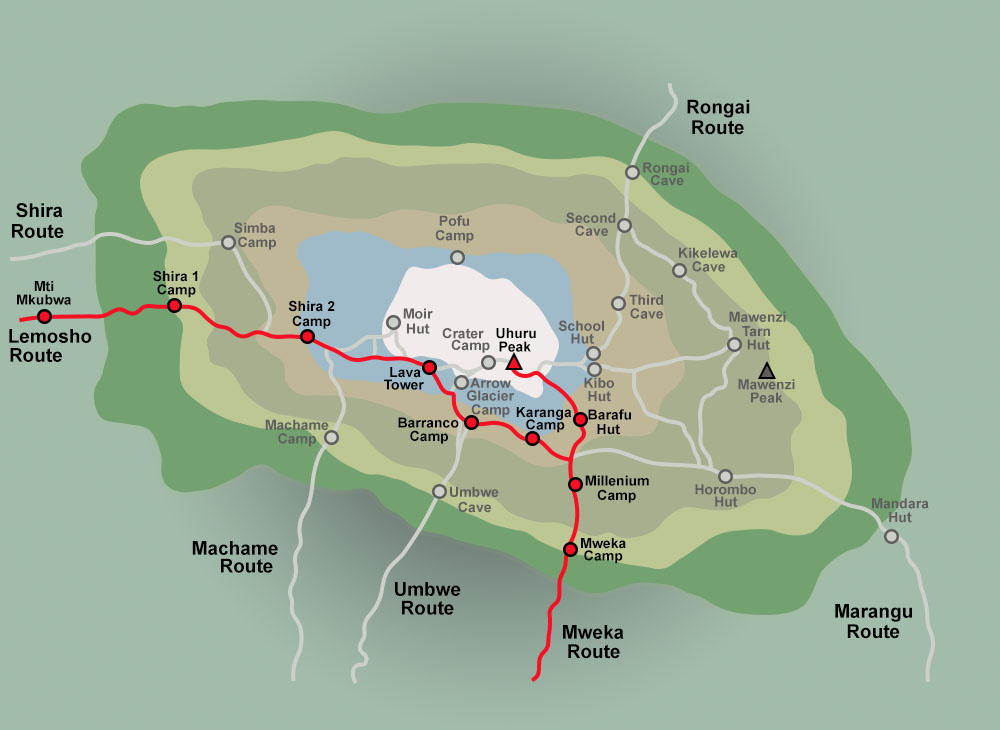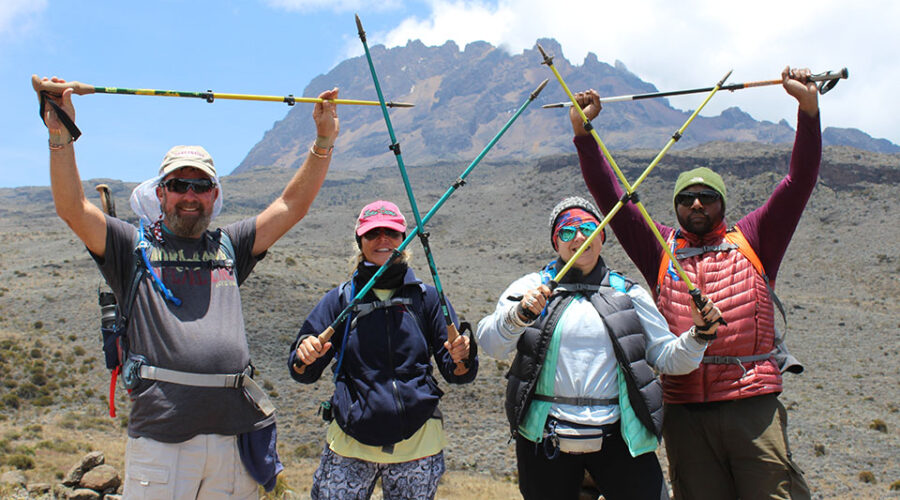The Marangu route, also known as the “Coca-Cola” route, is the oldest, most well-established route on Kilimanjaro. This is the only route that offers sleeping huts in dormitory-style accommodations in lieu of camping. There are 60 bunk beds each at Mandara and Kibo Huts, and 120 bunk beds at Horombo Hut. Guests are supplied with mattresses and pillows, but sleeping bags are still required. The huts have communal dining halls and basic washrooms, ranging from flushing toilets and running water at the lower huts to long drop toilets and buckets of water at Kibo Hut. Many favour Marangu because it is considered to be the easiest path on the mountain, given its gradual slope and direct path. However, the short time frame of the route makes altitude acclimatization fairly difficult. The route approaches Mount Kilimanjaro from the southeast. Marangu is unfortunately less scenic than the other routes because the ascent and descent are along the same path. It is also the most crowded route for that reason.
You will be picked up at the Kilimanjaro International Airport and transferred to the Kilimanjaro White House Hotel Bed and Breakfast in Moshi town; you will meet your guide who will brief you on your upcoming trek and do an equipment check to make sure you have all the necessary mountain gear. The missing gear can be rented on this day.
After breakfast and briefing, drive to the Kilimanjaro National Park Gate (45 minutes), register, and commence the climb. Walk through the rainforest to the Mandara encampment. A side trip to Maundi Crater is a good way to see the surroundings including Northern Tanzania and Kenya. In the rainforest, look for towering Eucalyptus trees, bird life, and Colobus monkeys.
Elevation: 5,500 ft / 1,700 m to 9,000 ft / 2,740 m
Distance: 7 km
Time: 4-5 hours
Climatic Zone: Montane Forest
Meals: L, D
Hut: Mandara Hut
You leave the glades of the rainforest and follow an ascending path on the open moorlands to the Horombo encampment. Views of Mawenzi and the summit of Kibo are amazing. Look for giant lobelias and groundsels. You may begin to feel the effects of the altitude.
Elevation: 9,000 ft / 2,700 m to 12,100 ft / 3,700 m
Distance: 11 km
Time: 6-8 hours
Climatic Zone: Heathland/ Moorland
Meals: B, L, D
Hut: Horombo Hut
Ascending, we now pass the last watering point, walking into the saddle of Kilimanjaro between the peaks of Kibo and Mawenzi. Vegetation begins with the upper heathland but then disappears into a “moonscape”. Dinner, rest and prepare for the summit climb.
Elevation: 12,100 ft / 3,700 m to 15,400 ft / 4,700 m
Distance: 10 km
Time: 6-8 hours
Climatic Zone: Alpine Desert
Meals: B, L, D
Hut: Kibo Hut
Very early in the morning (midnight to 2 am), commence the climb to the summit on steep and heavy scree or snow up to Gilman’s Point located on the crater rim. Continuing, we now ascend to Uhuru Peak, which is the highest point in Africa. There are unbelievable views at every turn. Have your picture taken at the summit to show your friends and family. From here we descend, stopping for lunch and a rest at Kibo before continuing on to the Horombo encampment. The beginning of this climb is done in the dark and requires headlamps or flashlights. It will be very cold until you start descending, so you will need all of your warm layers. This is by far the most difficult part of the trek with many switchbacks. Going slowly “pole pole” and an optimistic attitude will get you there!
Distance: 4 km up / 14 km down
Time: 10-15 hours
Climatic Zone: Alpine Desert
Meals: B, L, D
Hut: Horombo Camp
After breakfast, a steady descent takes us down through moorland to the Mandara Hut. Continue descending through the lush forest path to the National Park gate at Marangu. At lower elevations, it can be wet and muddy. Gaiters and trekking poles will help. Shorts and T-shirts will probably be plenty to wear (keep rain gear and warmer clothing handy). A vehicle will meet you at Marangu gate to drive you back to your hotel in Moshi. Don’t forget to tip your guides and porters. It is time for celebration! Transfer to Kilimanjaro Airport.
Elevation: 12,100 ft / 3,700 m to 5,500 ft / 1,700 m
Distance: 18km
Time: 5-7 hours
| Number of Travelers | Cost Per Traveler in US($) |
|---|---|
| 1 Person | $1,700 |
| 2 People | $1,680 |
| 3 People | $1,660 |
| 4 People | $1,650 |
| 5 People | $1,630 |
| 6 People | $1,610 |
| 7 People | $1,600 |
| 8 and above | $1,590 |

Mount Kilimanjaro can be climbed anytime throughout the year. Most travelers prefer climbing during the dry seasons: December to March, June to October. Many consider the best months to climb Kilimanjaro to be January, February, and September.
Your Kilimanjaro dream climb is entirely your own to design. We will work with you to customize exactly the triumphant Tanzanian mountainous quest experience you want. You go with the people you choose. You leave on whatever day you wish. You decide on your preferred route option, pace, and the number of days you will take.
You will need a Single entry visa to enter Tanzania. It costs 100$ for US citizens and 50$ for other nationalities. There are 3 ways to apply it.
1. Apply it online from this link – Official link to apply your visa
2. Get a visa on arrival if you are eligible – Read Eligibility Guidelines
3. Apply through Tanzanian Embassy in your home Country
Climbers are strongly advised to obtain travel insurance immediately after booking their trip.
On most routes, you’ll trek 4-7 hours most days. On certain routes you’ll trek as many as 10-15 hours on the longest days.
We are. We are not agents for anybody, but run the treks ourselves through our own registered Tanzanian local company.
The maximum number of people on the trek is eight. Occasionally this may stretch to nine or ten if, for example, there are already 6 people booked on the trek and a group of four want to join. On the rare occasion where this happens we will contact those already booked on the trek to see if they have any objection to the group size to grow above eight.
We can book a trek for just one person but, as stated above, this will be quite expensive. If you are a solo traveler, therefore, we strongly advise you to join one of the scheduled treks.
As we are charged in US dollars, so all our prices are quoted in US dollars too. However, we are able to accept a wide range of other currencies too including sterling, euros, Canadian dollars, Australian dollars, Israeli shekels, Singapore dollars, Indian rupees etc etc
We advise you to spend at least one full day in Tanzania before beginning your trek. Arriving by plane one day and then climbing the next is not the best way to begin a trek.
The guides have been trained in high-altitude medical care. Each trek will also be equipped with a comprehensive first-aid medical kit. The guides also carry oxygen for those people who are suffering from altitude sickness – though this is very much a last resort and the guides are trained to spot altitude sickness before it becomes necessary to use oxygen.
The guides have been trained in high-altitude medical care. Each trek will also be equipped with a comprehensive first-aid medical kit. The guides also carry oxygen for those people who are suffering from altitude sickness – though this is very much a last resort and the guides are trained to spot altitude sickness before it becomes necessary to use oxygen.
Yes, all Tanzania National Park (TANAPA) fees are included in our Kilimanjaro price. Currently, the conservation fees at Kilimanjaro National Park are: US$70 per person per day and US$50 per person per night for camping. Crew entry fees and Tanzanian Forest Services Agency (TFS) fees (applicable for Rongai, Shira and Lemosho routes) are also included in our Kilimanjaro price.
The minimum age limit set by Kilimanjaro National Park for children trekking to Uhuru Peak on Mount Kilimanjaro is 10 years old.
You will have one lead guide and an assistant guide for 2-3 climbers.
For 4-6 climbers, you will have one lead guide and 2 assistant guides.
For 7-8 climbers, you will have one lead guide and 3 assistant guides.
For 9-10 climbers, you will have one lead guide and 4 assistant guides.
We never rush our trek, instead, we like to take in the views and enjoy the experience. Some trekkers may be slower than others, but with our client-to-guide ratio, we are able to support everyone along the way. Our mantra, “pole pole” (Swahili for “slowly slowly”), reminds us to take our time and ensure that all of our trekkers have the opportunity to enjoy the experience fully.
We can offer a discount for more than 2 people, please enquire at the time of booking.
Highly-trained chefs prepare three hot nutritious meals daily, as well as trail snacks and afternoon tea each day. You’ll eat all your meals in a solar-lit dining tent with your fellow trekkers and head guide. Delicious vegetarian, vegan, gluten-free and other specialty meals can be provided (with advance request). We’re happy to send you a sample menu—just ask!
Your mountain camps are set up and broken down each day by expert camp porters. You’ll stay in double occupancy all-weather tents with full-ground pads to keep you and your gear dry. Private toilet tents, solar-lit dining tents with tables and chairs, and basins of hot water for washing are provided in every camp. Grand Traverse treks include upgraded solar-lit walk-in-height sleeping tents with mountaineering beds and mattresses for additional comfort.
The treks vary from six to eight days. The exact length of each trek is written on the Trekking dates and prices page. You can, of course, ask for treks that are longer than eight days and we can arrange this for you – though we don’t book treks for less than 6 days as we feel this is too short to allow you to acclimatize properly.
Always remember to maintain a slow, steady pace from beginning to end. Going slowly allows the body to acclimatize while hiking. Those who start out too quickly will have troubles higher up the mountain as the body will be overexerted. This still holds true if you are spending an extra day on the mountain.
It will depend on the route you pick and your pace. It can take from 4-8 hours to reach the summit from the high camp.
A 15% deposit is required at time of booking to hold your Kilimanjaro climb and 30% for your Tanzania safari.
Do not hesitage to give us a call. We are an expert team and we are happy to talk to you.
+255 749 516 344
info@ronadventure.com
Protected by Security by CleanTalk

